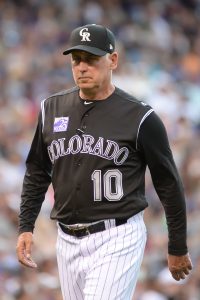4:10PM: Conforto is “not a top priority” for the Rockies, Patrick Saunders of The Denver Post reports, though the club has some level of interest.
1:52PM: Michael Conforto’s market continues to grow, as the Diamondbacks “were among the teams showing the most interest in Conforto before the lockout,” The New York Post’s Mike Puma writes. The Marlins had also been previously linked to Conforto, and Joe Frisaro of Man On Second tweets that Conforto remains on Miami’s list of outfield targets.
Such clubs as the Padres, Rockies, and Yankees have also been reported as suitors for Conforto’s services, with his market thus far representing an interesting cross-section of contenders and teams who struggled in 2021. The D’Backs are coming off a 110-loss season, while the Marlins followed up an appearance in the expanded 2020 playoff bracket with a 95-loss campaign last year.
This wide range of interested clubs could reflect Conforto’s status coming off a subpar (by his standards) .232/.344/.384 season over 479 plate appearances with the Mets. While Conforto rejected the Mets’ qualifying offer, speculation persists that Conforto might look for a shorter-term contract that would allow him to re-test free agency next winter. Since Conforto surely feels he’ll hit better in 2022, he naturally wouldn’t want to short-change himself by signing a longer-term contract now that is reflective of his 2021 numbers.
Even if Conforto is “looking for big free agent pay day,” as Frisaro puts it, he could still land a healthy salary on a one-year deal, which opens the door for many teams as possible fits. Clubs that may be wary of a longer-term commitment to Conforto (or not keen on longer-term commitments in general) could certainly be more open to a one-year arrangement, since a Conforto that returns to his 2015-20 form is a major addition to any lineup.
Though Arizona would seemingly be closer to a rebuild than a true push for contention next season, the D’Backs haven’t been willing to entirely blow things up, as the team still has some interesting core pieces as well as some younger players hoped to be on the verge of a breakout. To this end, the Snakes signed Mark Melancon to a two-year, $14MM deal prior to the lockout, and president/CEO Derrick Hall said yesterday that the Diamondbacks were looking to add some offense.
Hall said he “could easily” see a scenario where Arizona spends $17MM to push the projected 2022 payroll up to the $110MM range. Since Conforto would certainly want to at least top the cost of the qualifying offer ($18.4MM) on any one-year deal, he’d cost more than $17MM, thus putting him at the high end of the Diamondbacks’ possible spending range. Plus, if that hypothetical $17MM represents all the front office would have to spend on remaining needs, it is quite possible the D’Backs would prefer to spread that money around to several players rather than splurge on Conforto alone.
Conforto’s rejection of the QO could represent an obstacle for both the Diamondbacks and the Marlins, as either team would have to give up their third-highest pick in the 2022 draft as compensation for signing the outfielder. Surrendering such a notable pick for what might be a short-term deal is a hefty price to pay for an Arizona team that isn’t really in position to contend in 2022.
Likewise, the Marlins had also been wary about QO free agents when making their winter moves, but Miami has been more clear about its intent to challenge for a postseason berth next season. The Marlins have already signed Avisail Garcia and traded for both Jacob Stallings and Joey Wendle, and the Fish have also been reportedly chasing such big-ticket trade candidates as the Pirates’ Bryan Reynolds.
Just how much more the Marlins are willing to spend on upgrades, however, is still an unknown. Derek Jeter’s surprising departure as the team’s CEO was (according to some accounts) due to a change in ownership’s approach to spending heading into the 2022 campaign. Prior to the lockout, the Jeter-led Marlins were in talks with Nick Castellanos on a contract of longer than five years, according to MLB Network’s Jon Heyman (Twitter link), though only time will tell if such major expenditures are still on the Marlins’ radar now that the lockout is over.
Naturally, the Marlins can still improve their team without spending a ton of money — the Stallings and Wendle trades are evidence of that, and Miami has a lot of young pitching depth that could bring back a cost-controlled talent like Reynolds in a further swap. Conforto might also represent an interesting middle ground for the team, if he was indeed open to only a one-year contract. Miami could take the one-year payroll boost to add Conforto, look to benefit from a possible rebound year from the former All-Star, and then watch him depart in free agency next winter.

